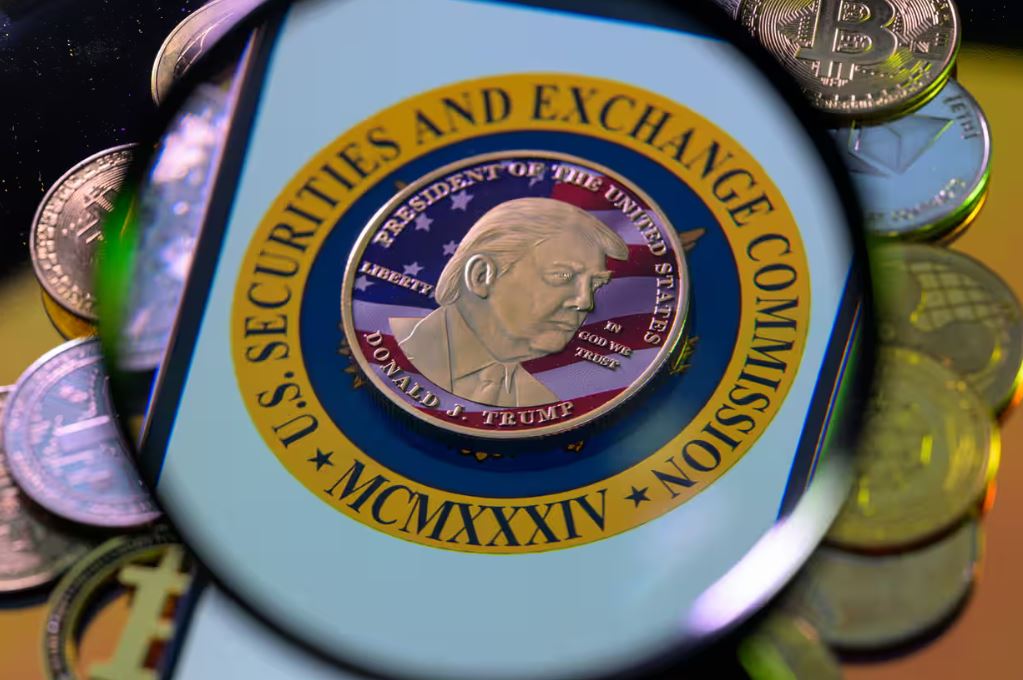
May 13, 2025 – In a controversial move blending politics and cryptocurrency, former President Donald Trump has rewarded the top investors of his self-branded digital coin, $TRUMP, with an invitation to a private gala dinner in Washington, D.C. The event, set to take place on May 22, will be held at the Trump National Golf Club in Virginia and includes an even more exclusive VIP reception for the top 25 buyers of the coin.
This announcement concludes a weeks-long contest that invited crypto buyers to compete for a seat at the table with Trump himself. The campaign has stirred widespread concerns among Democratic lawmakers, government ethics watchdogs, and even the Securities and Exchange Commission (SEC), who fear it may represent a new path for foreign or anonymous entities to purchase political influence.

The Rise of the $TRUMP Coin
The $TRUMP cryptocurrency was launched in mid-January 2025. It rapidly gained attention among Trump supporters and meme coin investors. By May, its market capitalization surpassed $2 billion, largely driven by an aggressive online promotional campaign that included direct endorsements from Trump on his Truth Social platform.
Despite this growth, analysts note that the majority of $TRUMP tokens are held by a company tied to the Trump family and another affiliated firm, as reported by Reuters. This has sparked fresh questions about whether the former president is using the cryptocurrency to personally benefit his business interests.
220 Winners—and VIP Access for the Top 25
According to the official $TRUMP website, the top 220 crypto buyers have been selected to attend the exclusive dinner event. “Congratulations, if you’re in the top 220 on the leaderboard, we will be contacting you in the next 24 hours,” read the statement posted on Monday, May 12. Attendees were told to expect a phone call and an email with more information.
Those ranked in the top 25 will be treated to an “ultra-exclusive VIP reception” with the former president. While the names of winners were not made public, the website does display wallet addresses and usernames, leading to speculation about the identities and intentions of the coin’s biggest buyers.
Interestingly, if a buyer cannot attend the event, they are allowed to send a representative in their place, such as a family member or friend. This flexible policy has only fueled additional speculation about who might be seeking access to Trump and for what reasons.
Foreign Influence and Blockchain Anonymity
The $TRUMP contest has raised red flags about possible foreign influence in U.S. politics. An analysis by Bloomberg of blockchain data revealed that many top $TRUMP investors used foreign crypto exchanges that prohibit U.S.-based users from purchasing the coin. This has heightened fears that non-U.S. individuals or entities could be using the token as a backdoor method to gain influence over a former and potentially future president.
Senator Richard Blumenthal of Connecticut has formally opened an ethics inquiry into cryptocurrency and its promotion. In a letter addressed to Bill Zanker, a key figure listed on the registration papers for the LLC behind the coin (Fight Fight Fight LLC), Blumenthal warned of the risks posed by the pseudonymous nature of blockchain.
“$TRUMP allows, and even invites, anyone in the world, including foreign governments and unscrupulous individuals, to directly enrich the President,” Blumenthal wrote, “while hiding potential payoffs in the pseudonymity of the blockchain.”
The White House Responds
In response to the growing criticism, the White House has defended the contest. Press Secretary Karoline Leavitt stated last week that President Trump is in full compliance with all conflict-of-interest regulations. She emphasized that the auction and crypto activities “will not influence the president’s policy decisions.”
Still, watchdogs argue that even if the process is technically legal, it creates troubling optics and sets a dangerous precedent for political fundraising and access trading in the digital age.
The value of $TRUMP has been anything but stable. After launching on January 17, the coin initially surged to around $75 before experiencing a sharp decline. By the end of the auction period in May, it was trading at approximately $12.
According to trading data, around 760,000 investors lost money buying and selling the token during its peak hype cycle. In contrast, the top buyers collectively spent millions of dollars in an attempt to climb the leaderboard and secure a seat at the Trump dinner.
“This is a high-security, high-status event with President Trump,” the $TRUMP website emphasized. “If you earned a seat at the table, it’s because you earned it.”
Ethics in the Age of Meme Coins
This unique blend of cryptocurrency, political branding, and real-world incentives has set off a firestorm of debate in Washington and beyond. Critics argue that the $TRUMP token blurs the line between personal enrichment and public service, and could pave the way for a new form of influence-buying.
By leveraging blockchain’s anonymity and meme culture’s viral power, the Trump campaign has created a fundraising machine that’s hard to regulate and harder to trace. As crypto continues to shape the future of finance, it’s also becoming a tool in the high-stakes world of politics.
Whether the dinner on May 22 is a celebration of digital innovation or a cautionary tale of ethical lapses remains to be seen. But one thing is clear: the $TRUMP coin has already made a major impact, not just on the market, but on the future of political fundraising.























